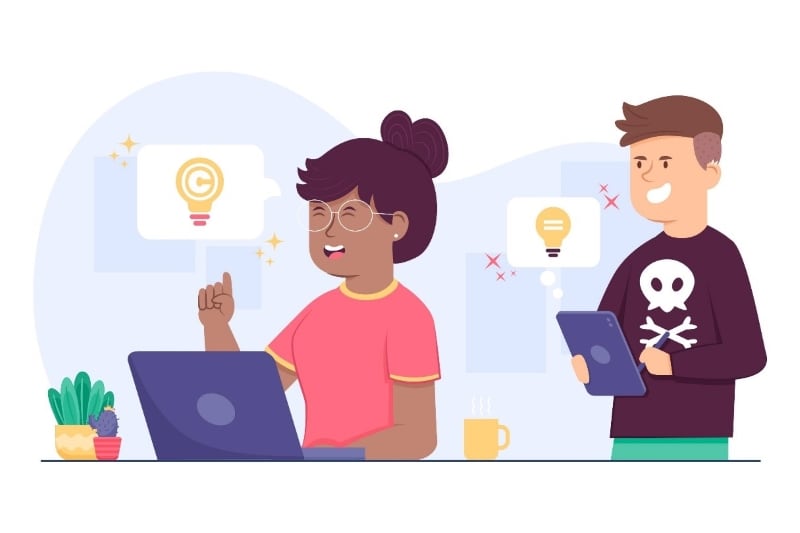Facebook Video Maker - Wondershare Filmora
Provide abundant video effects - A creative video editor
Powerful color correction and grading
Detailed tutorials provided by the official channel
Copyrights are a serious concern that is quite common within the digital world. To keep the originality of the content, terms such as copyright are kept in the account. Digital content creators creating unique and original content need to protect their work from being copied across the place. Many people utilize other creators' work for gaining monetary gains.
To counter all such threats of copyright infringement, social media platforms such as Facebook provides users with a clear copyright action policy. Not only does this explain how users can counter issues of copyright with their content, but it also focuses on how they can avoid it across their content. This article focuses on the Facebook video copyright details and discusses how users can counter where their videos are removed across the platform.
Part 1: Copyright – Explaining All Important Dynamics to this Legal Right
We have heard people saying, “Facebook removed my video due to copyright.” By jurisdiction of the digital community and international laws, copyright is known as a legal right that protects the original authority over the content and information developed. Any work that has been designed, developed, or created by a user has copyright over it once it has been created and deployed.

Talking about what copyright covers in its ambits, a variety of work is catered across this terminology. Any visual or audiovisual work, audio content, and literary work created by users have designated copyrights of the user responsible for its creation. The basic eligibility criteria for such content is to be original to fit the cross-fits of copyright.
This requires the content to have a minimum percentage of creativity that would cater to its plausibility to have copyright over it. However, names, slogans, and titles do not come with the possibility of having copyrights over them.
How to Know The Content Can Have Copyrights?
Until now, many would question how they can have the idea of the content to own Facebook video copyright? To answer this question, it is better to go through a few situations that would explain how a user can assess their content to have copyright. Considering you appear in a video or photo, it necessarily does not provide you the copyrights over it.
On the other hand, anything that you or a client has potentially created provides you with certain copyrights over it. It explains that users can simply understand their position over how original their content is to be called copyright material.
Rights as Copyright Owner
Being an owner of some content, you can practice certain rights to protect and secure your content from being used on other platforms without your consent. The rights are discussed as follows, providing an understanding of how they can protect their content.
- Stopping from copying and distributing the work.
- Creating new works based on your work.
- Grant permission to users to use the work for a use case.
Copyright infringement, the term recognized over the breach of copyright, occurs when people utilize the copyrighted work without the owner's permission.

The Duration of a Copyright Protection
Most people would consider Facebook video copyright to be a right that users can have for eternity over their content; however, the duration for the copyright protection does not last forever. The work created eventually becomes part of the public domain, losing its position as copyright material. Once the work is available across public domains, nothing can be effectively done under copyright infringement for the content.
Copyright VS Trademark
Copyright is based on a term primarily based on preventing the duplication of creativity. This term defines the originality of the content and provokes people to create their own ideas. On the other hand, Trademarks are more directed to prevent harm and confusion among customers.
Trademarks are usually consulted over identifying a company that prevents other users from copying their logos and names to confuse the customers. This type is directed towards offering consumers protection over duplication.
Part 2: I Posted a Video on Facebook, Which was Removed Immediately! What Are My Options?
Are you confused with the question of “Facebook removed my video due to copyright?" Videos removed immediately after being posted across Facebook usually contain someone else's copyrighted content. This may occur across the video, audio, or content that has been utilized across the post. However, it is important to look into the reasons and the options that a user may have after removing their video from the platform.
An email and a notification over copyright infringement will be sent to the perpetrator, which includes some confirmations over the point of posting the content. Facebook tries to come up with a middle-way solution for its users, providing them effective results over the issues such as the copyright action. If you are still confident in posting the content, Facebook requires some confirmation or other possibilities to help you publish the content.
On the other hand, if it seems impossible to get to a solution over the ownership rights of the content, users are advised to connect with the owner to resolve the issue directly. Since the notification mentions the content owner who filed for copyright actions, you can easily get in touch with the person to resolve the issue. You can also consider appealing the removal of your content for gaining appropriate reasons over its removal.
The information that is received by the user containing the details of the applicant filing for copyright action is provided as follows:
- Report number and owner's name.
- Email address of the reporting party.
- Details of the report and instructions to be followed, if any.
- Guide to submit an appeal
What Happens Over Repeating Infringement
Facebook has a no-tolerance policy for users who repeatedly breach the copyright of other users' content. Under such circumstances, the platform considers disabling the account or the page is run, if any. While abiding by the rules, Facebook either restricts your posting across the platform or completely disables the account, mostly based on the extent of the infringement.
How Does a Copyright Report Proceed?
This information is useful for users who report Facebook video copyright breaches of their content over someone's post. Facebook receives the email and provides you with the particular number that would act as the identification of the 'ticket' created. Once done, Facebook looks into the issue and notifies the person that has breached the copyrights.
However, under some circumstances, Facebook demands some questions for the person submitting the report, intending to know more about the case if not clarified. Once clear, clear action is taken by the authorities, with proper notifications sent to the user explaining the updates of the report.
Part 3: Tips to Make Sure that Posted Content Does Not Violate Copyright Law
This part provides users with some tips to prevent them from facing copyright infringement allegations. While being across Facebook, users need to follow a set of tips that would explain how to protect themselves from violating copyright law. There are a few things that a user needs to prevent using across their posts. While focusing on these points, users would be more in control of their content.
- Refrain from using bought or downloaded content from websites, such as iTunes.
- Content that has been recorded across personal recording devices.
- Try to give credit to the owner of the content.
- Add a disclaimer that would clear the intention of using copyright content or infringing it.
- Do not intend to profit from the content.
- Try to add original content in major proportion across your content.
- Do not think that the posted content is of fair use.
While covering these points mentioned above, you should also be vocal in getting permission to use the work of another owner across your design. With an idea over these points, you are quite sure how and what to post across Facebook. While covering all the points discussed above, it can avoid copyright infringement across the content.
Conclusion
The copyright claim is an important part of the content made across the ambits of originality. Users work across their designs, documents, or models, which requires particular protection. While surviving across platforms such as Facebook, the tool ensures that the content posted across the platform is out of the boundaries of Facebook video copyright infringement. Facebook has kept a no-tolerance policy for such cases and advises users to follow a set of options that would help them prevent such problems in the future.



 Be the first to receive discounts and deals
Be the first to receive discounts and deals Access personalized recommendations just for you
Access personalized recommendations just for you Enjoy early access to new features and updates
Enjoy early access to new features and updates